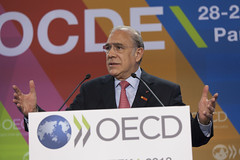ASIA
04 May 2014
OECD calls for a new deal
"It's time for a new deal", cried Angel Gurria, OECD Secretary-General, at the opening of the OECD Forum 2013.
"It's time for a new deal", cried Angel Gurria, OECD Secretary-General, at today's opening of OECD Forum 2013. And as Gurria elaborated, this new deal must address jobs, equality and trust, the "social deal-breakers".
Echoing the cry of development economists, Gurria called for a new era of "inclusive growth".
Why?
Six years into this crisis, economic performance of the OECD group of rich countries is still mediocre. May be 1.2% in 2013, less than the previous year.
Unemployment is alarmingly high at 49 million for the OECD region, 14 million higher than before the crisis. Most worryingly, long-term unemployment (longer than one year) has doubled to 17 million since 2007. And youth unemployment is some 17% of our work forces.
Inequality, which had been increasing in the three decades before the crisis, has since deteriorated faster. In the three years to 2010, inequality has widened more than in the previous 12 years. Trickle-down economics is not working.
And then there has been a systematic loss of trust by our citizens in government, business, banks, markets and international organizations. Very few citizens believe that governments are capable of improving the present situation.
Gurria recognized that international organizations like the OECD have not done a stellar job. They need new ideas, and to do a better job.
Our economic system is uncertain, unstable, and fragile. We need solutions, enthusiasm and hope.
So "it's time for a new deal". A new system. People must be put at the center.
Gurria offered a long list of challenges. Economic growth and inequality. Inclusive growth. Quality of growth, not quantity. Respect for the environment. Growth within limits.
Our societies need help. Governments have unprecedented challenges. Youth lack opportunity. We are on a collision course with nature.
We need a new approach to economic challenges, new tools, a new GPS. We need to confront vested interests.
We need to foster human progress. We need to connect knowledge to people. "It's all about people!"
It is hard not to feel inspired by Gurria. He has a great grasp of the challenges and may be even the solutions. He also seems to have a deep sympathy with those who have suffered through the crisis.
But can he and this admirable OECD Week change things, and foster better lives for us all? Like me, much of the audience were left wondering.
Executive Director
Asian Century Institute
www.asiancenturyinstitute.com
Echoing the cry of development economists, Gurria called for a new era of "inclusive growth".
Why?
Six years into this crisis, economic performance of the OECD group of rich countries is still mediocre. May be 1.2% in 2013, less than the previous year.
Unemployment is alarmingly high at 49 million for the OECD region, 14 million higher than before the crisis. Most worryingly, long-term unemployment (longer than one year) has doubled to 17 million since 2007. And youth unemployment is some 17% of our work forces.
Inequality, which had been increasing in the three decades before the crisis, has since deteriorated faster. In the three years to 2010, inequality has widened more than in the previous 12 years. Trickle-down economics is not working.
And then there has been a systematic loss of trust by our citizens in government, business, banks, markets and international organizations. Very few citizens believe that governments are capable of improving the present situation.
Gurria recognized that international organizations like the OECD have not done a stellar job. They need new ideas, and to do a better job.
Our economic system is uncertain, unstable, and fragile. We need solutions, enthusiasm and hope.
So "it's time for a new deal". A new system. People must be put at the center.
Gurria offered a long list of challenges. Economic growth and inequality. Inclusive growth. Quality of growth, not quantity. Respect for the environment. Growth within limits.
Our societies need help. Governments have unprecedented challenges. Youth lack opportunity. We are on a collision course with nature.
We need a new approach to economic challenges, new tools, a new GPS. We need to confront vested interests.
We need to foster human progress. We need to connect knowledge to people. "It's all about people!"
It is hard not to feel inspired by Gurria. He has a great grasp of the challenges and may be even the solutions. He also seems to have a deep sympathy with those who have suffered through the crisis.
But can he and this admirable OECD Week change things, and foster better lives for us all? Like me, much of the audience were left wondering.
Author
John WestExecutive Director
Asian Century Institute
www.asiancenturyinstitute.com




